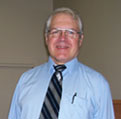| mission statement | a word from the chairman | contact information |
A WORD FROM THE CHAIRMAN
The Specialized Neuroscience Research Program (SNRP) led by Musa A. Haxhiu, MD, PhD was successfully renewed into a second five-year grant period. Dr. Haxhiu has since then resigned from his academic position and the directorship of the SNRP to return to his previous institution, Case Western Reserve University in Cleveland. Dr. Haxhiu’s move triggered a number of changes in the direction/management of the SNRP. V. John Massari, PhD, of the Department of Pharmacology was nominated as the new SNRP director, with Dr. Gnadt as co-director. In the course of this change in leadership, important re-organization and re-allocation of funds and resources took place. Research space for the SNRP core facilities was significantly enlarged, and considerable funds were made available to the program by the Department. In addition, a new Program Coordinator and a new Technical Director were hired.
As new chairman, I have initiated establishing an internationally recognized and competitive Non-Human Primate Neuroscience Research Center at Howard University as a major strategic goal of future-oriented research and research organization. Besides my own research interests in non-human primates, recruitment of academic personnel has been initiated namely with the coming on board of James W. Gnadt, PhD, and two further faculty members using non-human primates in experimental paradigms are sought to establish a critical mass for the Center. This strategic goal is being facilitated by a newly established partnership with the respective Departments at Georgetown University in Washington DC (Georgetown/Howard Universities Neuroscience Consortium). For medical, dental, pharmacy, allied health and graduate students new curriculum approaches and programs are under way. To this end, significant collaborative efforts have been initiated as well between our Department and the Department of Physiology & Biophysics of Georgetown University. In summary, our Department is in the process of rejuvenation, and we have requested the necessary institutional support to bring about the envisioned new strategic initiative for the benefit of the School of Medicine, in particular, and Howard University at large. Following the installation of a new chairman, the departmental faculty is motivated and cohesive to start new programs, take on new challenges and fulfill the teaching and research obligations at hand.
For teaching medicine, including physiology, pharmacology and neuroscience, to students, a truly integrated curriculum schedule has be developed that takes into consideration as much as possible all aspects of the biological organism. Molecular biology, genetics, cell biology, embryology, anatomy, histology, physiology, biophysics, imaging and evolution would be taught as an interconnected ensemble, rather than as separate entities. Problem-solving based learning is one way to achieve such integrative learning, but should not be the only pedagogical method used. Traditional lectures are still useful. Furthermore, a better integration between theory and practice, whether practical work in the laboratory or in the clinical environment with patients (to establish awareness of the interrelation between basic science, pathophysiology and therapy), must be sought as early as possible. Computer animations, video projections and multi-media information complement traditional teaching methods. The classical medical/pharmacological themes would also need be extended into more generalized neuroscientific and cognitive research areas, since cognitive/neuropsychological approaches certainly bear important interdisciplinary implications for the ultimate understanding of the global functioning of the human brain and mind. With reference to prophylaxis and prevention, in particular, sociological and psychological issues must be part of the curriculum.
Medical students would gain at being exposed to research, basic as much as clinical, just as researchers in fundamental biosciences gain from contacts with clinicians. Furthermore, the number of researchers being able or willing to carry out clinical research is insufficient in North America. An effort must be made at interesting medical students in research, by making it possible or easier for them to work in research laboratories. A specific institutional program can be created to that effect. Even if they do not participate in research afterwards, their own medical practice can only gain from their insight into the world of research. For those medical students truly interested in research, a strong and basic-science oriented MD/PhD program is ideal, and would need to be strengthened.
Strong and attractive basic educational programs form the basis for the selection and recruitment of graduate students who will develop into the scientific elite of the future. In that regard the highest levels of excellence and motivation need to be achieved. A country's future and standing in the world rests on its educational and scientific achievements. Thus, the creation of selective and well funded graduate programs is absolutely necessary, both in scientific as well as in material support for the eligible students, that will ultimately produce a body of nationally and internationally competitive scientists and educators. The graduate program is centered around the strongest research themes of the department. Furthermore, a multidisciplinary programs, an endeavor Neuroscience is ideally suited for, is in progress to be developed.
A most effective way to motivate and lead is by setting the best example, i.e., spending more time in the laboratory or office than others, working harder, staying ahead in literature and technologies, trying to have the better and more balanced judgment, and having a maximum of information available. Leading a group of people should always occur in the manner of "primus inter pares" (first among equals), who "governs" by consensus building, rather than handing down an imperial dictum. In other words, leadership means to bear responsibility, not privilege. In that context the words of Frederic II, the Great, King of Prussia, come to mind: “I am the first servant of my state”. Over the years, such a concept of leadership creates better group dynamics, motivation and loyalty, than simple top-down relationships. |
 The Department of Physiology & Biophysics saw a number of important changes occurring during the past two years.
The Department of Physiology & Biophysics saw a number of important changes occurring during the past two years.